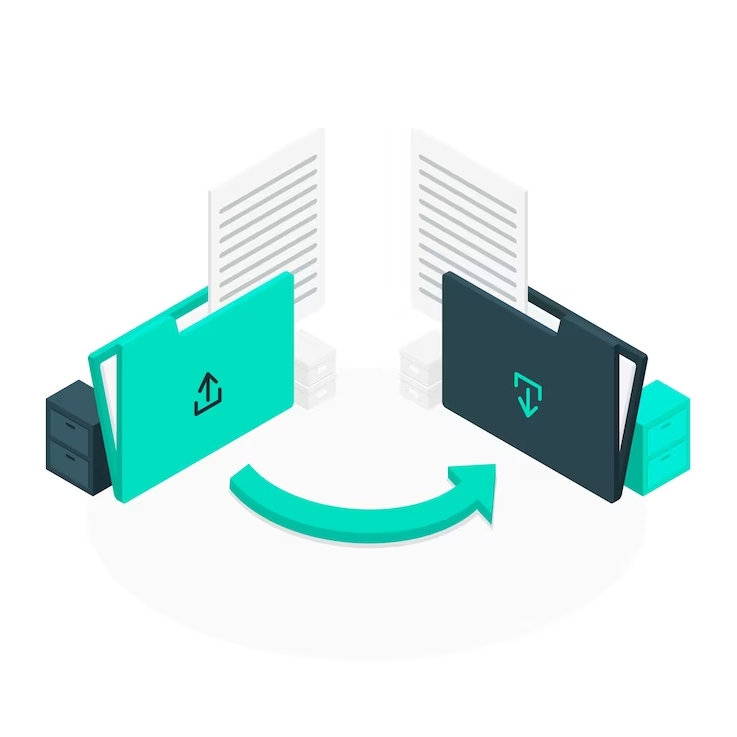Demand for seamless and efficient document conversion continues to rise, understanding the merits and drawbacks of online and offline solutions is paramount. This paper delves into the comparative analysis of online and offline document converters, aiming to provide a comprehensive overview of their functionalities, accessibility, security, and overall suitability for diverse user needs.
Online Doc Converters
In the dynamic landscape of digital document management, online document converters have emerged as accessible and user-friendly solutions. Operating through web browsers, these tools provide a convenient platform for converting various file formats without the need for software installations.
Pros of Online Doc Converters:
- Accessibility: One of the key advantages of online converters is their accessibility. Users can convert documents from any device with an internet connection, eliminating the constraints of specific software or operating systems.
- No Installation Required: Online doc converters offer a hassle-free experience by eliminating the need for software installations. This feature makes them particularly appealing to users who prefer a quick and straightforward conversion process without the burden of installing additional applications.
- Regular Updates: Online converters are often subject to frequent updates, ensuring that they stay current with the latest file formats and technological advancements. This feature allows users to benefit from ongoing improvements and expanded functionality.
Cons of Online Doc Converters:
- Dependence on Internet: Despite their convenience, online converters are reliant on a stable internet connection. Users in areas with inconsistent connectivity may experience challenges in accessing and utilizing these tools.
- Privacy Concerns: Uploading sensitive documents to online platforms may raise privacy concerns for some users. While reputable online converters implement security measures, individuals dealing with confidential information might be hesitant to utilize these services.
- Limited Features: Online converters may lack some advanced features present in their offline counterparts. Users with specific or complex conversion requirements might find that online tools do not fully cater to their needs.
In the next sections, we will delve into offline document converters, compare their features with online counterparts, explore various use cases, and discuss crucial considerations related to security and privacy.
Offline Doc Converters
In contrast to their online counterparts, offline document converters operate locally on users’ devices, offering a distinct set of advantages and considerations. These tools, installed as traditional software, provide users with a more independent and customizable document conversion experience.
Pros of Offline Doc Converters:
- Privacy: One of the primary advantages of offline converters is enhanced privacy. Since files are processed locally on the user’s device, there is a reduced risk of exposing sensitive information during the conversion process.
- No Internet Dependency: Offline converters function independently of an internet connection, providing users with the flexibility to convert documents even in environments with limited or no internet access. This characteristic is particularly valuable for users working in offline settings or areas with unreliable connectivity.
- Advanced Features: Offline document converters often boast a broader range of features compared to their online counterparts. These advanced functionalities may include batch processing, customizable settings, and support for a diverse array of file formats.
Cons of Offline Doc Converters:
- Installation Required: To use offline converters, users must go through the process of software installation. While this step provides a more robust and feature-rich experience, it also requires users to allocate time and resources to set up the software on their devices.
- Updates: Unlike online converters that seamlessly update in the background, users of offline converters need to monitor and manually update their software to access the latest features, improvements, and support for new file formats.
- Device-Specific: Offline converters are tied to the specific device on which the software is installed. This limitation means that users must have access to the installed software on a particular device to perform document conversions.
As we proceed, we will delve into a detailed comparison of features between online and offline doc converters, explore their respective use cases, and address critical considerations related to security and privacy.
Comparison of Features
When assessing the features of online and offline document converters, several considerations come into play. Online converters, known for their accessibility, excel in providing a user-friendly interface that requires no installation. However, they may lack some of the advanced features that offline converters offer. Offline converters, installed locally on a user’s device, often provide a more robust set of tools, including batch processing and extensive format support.
Online converters typically prioritize simplicity, making them ideal for quick and straightforward conversions. Users can upload files, select the desired output format, and swiftly obtain the converted document. In contrast, offline converters cater to users with more complex needs. The ability to customize settings, process multiple files simultaneously, and support a broader range of file formats distinguishes offline converters in terms of versatility and functionality.
Considering the evolving nature of document management, both online and offline converters regularly update their features. Online platforms, with their seamless connection to the internet, can swiftly integrate improvements. On the other hand, offline converters necessitate manual updates, requiring users to stay proactive in ensuring they have access to the latest functionalities and format support.
| Feature | Online Doc Converters | Offline Doc Converters |
| Accessibility | Any device with internet access | Tied to the device with the software installed |
| Installation Required | No installation needed | Requires software installation |
| Privacy | Concerns about uploading sensitive documents to the cloud | Local processing reduces privacy concerns |
| Internet Dependency | Requires a stable internet connection | Functions independently of internet access |
| Advanced Features | Limited features compared to offline counterparts | Often offers advanced features, such as batch processing and customization |
| Updates | Regular and automatic updates | Manual updates may be required |
Examining these features can aid users in determining which type of document converter aligns more closely with their specific requirements and workflow preferences.
Use Cases
The choice between online and offline document converters significantly hinges on specific use cases, adressing the diverse needs of users across various scenarios.
Online Converters in Practical Use
Online document converters shine in scenarios where quick, uncomplicated file conversions are paramount. They are particularly beneficial for users who need to convert documents on the go, especially in situations where internet access is readily available. Students collaborating on projects, individuals using shared computers, or those working in environments with minimal IT support often find online converters convenient due to their accessibility and ease of use.
These converters are also suitable for users dealing with non-sensitive information, as they provide a streamlined conversion process without the need for additional software installations. However, individuals working with confidential or proprietary data might approach online converters cautiously, given potential privacy concerns.
Offline Converters for Specialized Needs
Offline document converters cater to users with more specialized requirements, offering advanced features that enhance the overall document conversion experience. Professionals dealing with large volumes of files, intricate formatting, or specific file formats may find offline converters indispensable.
For instance, graphic designers, architects, or engineers working with intricate drawings and documents might benefit from the advanced customization options and extensive format support provided by offline converters. Additionally, users operating in environments with limited or no internet connectivity, such as remote locations or secure facilities, can rely on offline converters to ensure uninterrupted workflow.
Security and Privacy Considerations
In the realm of document conversion, security and privacy are paramount concerns that users must carefully weigh when choosing between online and offline converters.
Online Converters and Privacy Challenges
Online document converters operate by uploading files to external servers for processing. While reputable platforms implement security measures such as encryption to protect data during transmission, the act of uploading sensitive documents to the cloud raises inherent privacy concerns. Users should exercise caution and choose trusted online services with a track record of prioritizing data security.
Additionally, users working with confidential information should be aware of the platform’s data retention policies. Confirming that files are promptly and securely deleted after conversion can mitigate the risk of unauthorized access.
Offline Converters and Enhanced Privacy
Offline document converters, by processing files locally on the user’s device, offer a higher degree of privacy compared to their online counterparts. Since sensitive information remains within the user’s control, the risk of data exposure is significantly reduced.
However, users should still practice good security hygiene. Regularly updating the offline converter software is crucial to patch potential security vulnerabilities. Moreover, downloading software from reputable sources and verifying the legitimacy of the application helps ensure that the tool does not compromise the security of the user’s system.
Choosing Based on Security Requirements
The decision between online and offline converters often boils down to the level of security required for the specific documents being handled. Users dealing with non-sensitive information or working in collaborative, non-confidential settings may find online converters sufficient for their needs.
Conversely, professionals working with confidential, proprietary, or classified information may prioritize the enhanced security offered by offline converters. In these cases, the ability to keep sensitive data within the confines of the user’s device provides an additional layer of control and reduces exposure to potential security risks associated with online data transmission.




